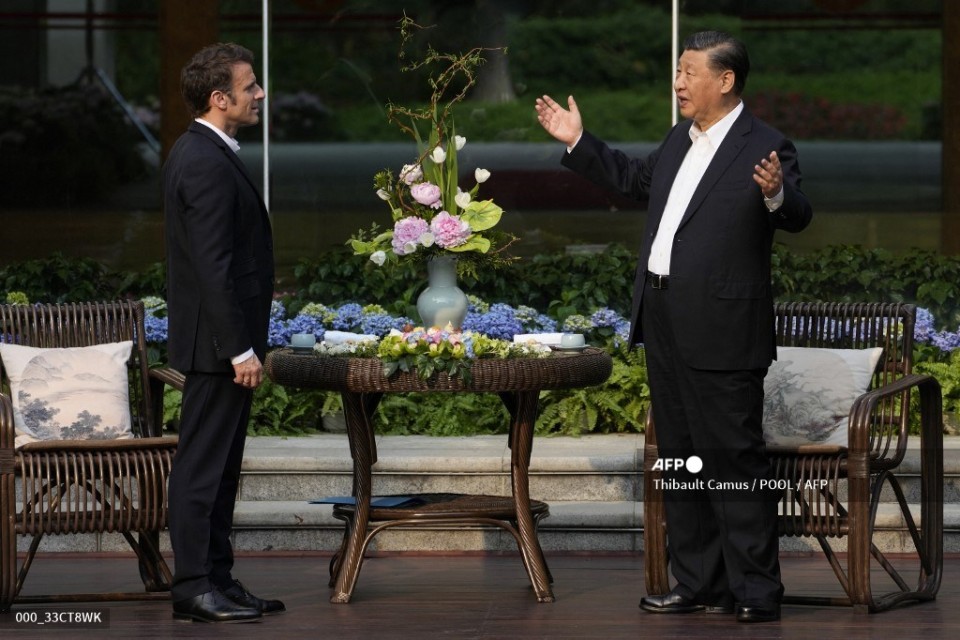
Beijing, China | AFP | Wednesday 4/12/2023
Emmanuel Macron’s unexpected suggestion that Europe not “follow” US policy on Taiwan is being hailed as a “brilliant decision” this week in China, where state news outlets and social media users are lauding his independence.
The French president sowed confusion across the international community — and left Western allies bristling — after calling for “strategic autonomy” on Taiwan following last week’s trip to China, where he met with President Xi Jinping.
The 45-year-old Macron enjoyed a rockstar reception during his three-day visit, including being mobbed by selfie-chasing students in the southern city of Guangzhou, and local media has covered his subsequent comments widely, focusing on the phrase “strategic autonomy”.
An opinion piece published Monday by the Chinese Communist Party-run Global Times said the comments were “clearly the result of Macron’s long-term observation and reflection” and represented a path that was “relatively objective, rational and in line with Europe’s own interests”.
“Some people want to construct a false Europe in public opinion, masking true European voices and interests,” the article added.
Chen Weihua, Brussels bureau chief for state-run China Daily, wrote on Twitter that “Macron’s words about EU strategic autonomy and resisting a new Cold War and decoupling will also prove to be a brilliant decision”.
Beijing, which claims Taiwan as part of its territory to one day be taken back, has long sought to break Western resolve on the thorny issue.
And Macron’s recent words on distancing Europe from Washington on the subject of Taiwan suggest China’s efforts might be having some success.
“Daring to talk openly about autonomy,” commented a user of social media site Weibo under a news article on Macron, “Europe has progressed.”
‘Brilliant decision’
While the reputations of most Western leaders in China have suffered in recent years, Macron enjoys a largely favourable public image — an attitude made evident by the hordes of students in Guangzhou.
His willingness in the recent interview to differentiate French foreign policy from that of the United States on the issue of Taiwan helped bolster that fan base.
One Weibo user commented: “Macron’s ideas are very good. Europe’s arrogance and inaction for many years have led to extreme strategic passivity, being pulled along by the US.”
Beijing also Wednesday praised Macron’s remarks, saying it was “not surprised” by the negative reaction from some in the West.
“Some countries do not want to see other nations become independent and self-reliant, and instead always want to coerce other countries into obeying their will,” foreign ministry spokesperson Wang Wenbin told a regular briefing.
“An insistence on strategic autonomy wins more respect and more friends, while coercion and pressure only brings more resistance and opposition,” he added.
But such triumphant Chinese perspectives have also been tempered by more sober voices contending that geopolitical realities necessitate that France and Europe remain largely aligned with the United States.
Hu Xijin, a prominent political commentator and former editor-in-chief of the Global Times, wrote Monday on Weibo that — despite Macron’s rosy comments — it was “unrealistic” for China to think France would side with it in future confrontations with Washington.
Europe and the United States “have shared values and are bound together by NATO,” wrote Hu.
“But we can firmly believe that as long as China treats European countries reasonably and fairly while the US forces them to oppose China, conflicts between their strategic interests will rise to the surface.”
Other online commentators were more cynical about the reasoning behind Macron’s comments.
“What’s the use?” wrote one Weibo user. “He’ll say one thing when he comes here to earn economic benefits, then do another when he gets the money. It’s been like this for decades.”
© Agence France-Presse








